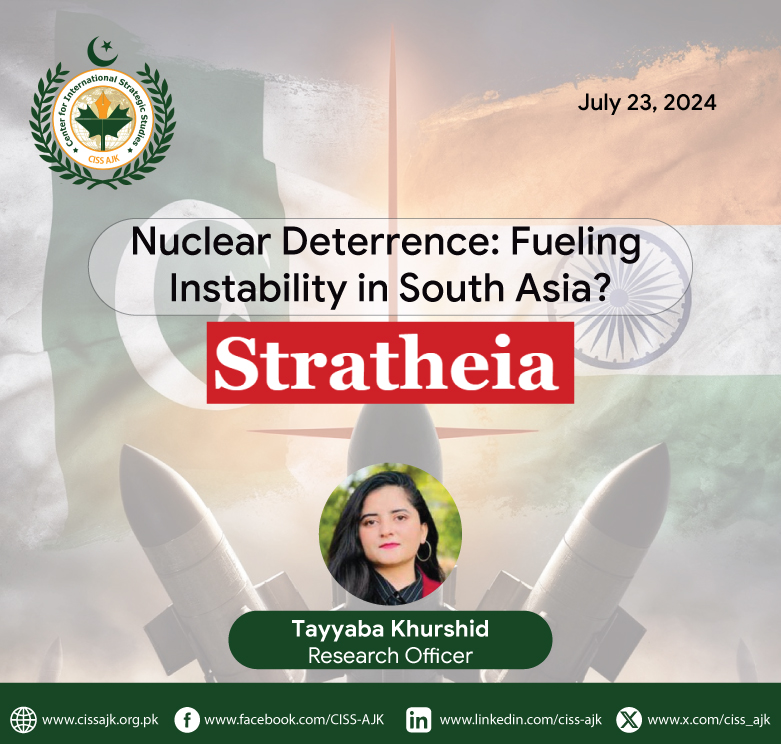552
The inherent structure of International politics compels states to maximize their power and rely on advanced weapons and technology to maintain dominance and edge over the enemy to ensure survival. But when a state increases its power, it instigates the insecurity of the enemy causing an arms race. The India-Pakistan relationship presents the best example, where India has been continuously involved in maximizing its power by integrating all means of power-(focusing on air, land, sea, nuclear, space, and cyberspace) and compelling Pakistan to follow the path for its security and survival.
The South Asian strategic environment is filled with mistrust, animosity, and hostility. The leadership in India and Pakistan relies on past experiences for the future course of relations. And present situation presents no progress in bilateral relations paving hurdles for the normalization of ties, trade, and arms control efforts. The past relations, unresolved Kashmir Issue, and resulting mistrust have led them to focus on building up weapons and modernizing their nuclear forces.
They rely on deterrence offered by nuclear weapons without arms control efforts to maintain strategic stability. Hence, the continuous reliance on aggressive means without bilateral arms control arrangements is destabilizing the South Asian strategic environment. This demands comprehensive bilateral arms control initiatives between both states. According to SIPRI Yearbook 2024, India and Pakistan are two of the top 5 arms importers for 2023 and Asia was the largest region to receive arms. The growing reliance on arms and modernization of nuclear forces is due to the mistrust resulting from Territorial issues, and lack of dialogue. This has resulted in the unwillingness of both states to move towards arms control initiatives. India has 172 warheads, 2 more than Pakistan standing at 170 warheads as per the SIPRI yearbook.India and Pakistan are among the top 5 arms importers, with Asia being the largest region to receive arms in 2023, according to SIPRI Yearbook 2024.
It reflects that India is continuously increasing its nuclear arsenals. The overall global nuclear arsenals have also increased and currently 12121 nuclear weapons are present out of which 9585 are ready for deployment in military stocks. The existing global arms control initiatives have also declined and too much attention and war in Europe and the Middle East has increased the proliferation concerns worldwide. South Asia remains one of the nuclear flashpoints with a long-standing issue of Kashmir. India has been actively involved in building long-range capabilities that transcend Pakistan and China and target Europe now. Moreover, the South Asian force structure relies too much on deterrence without focusing on arms control initiatives. Currently, there is no bilateral treaty between two South Asian rivals to control nuclear proliferation in the region and both states are non-party to various multilateral arms control frameworks due to their political differences. Neither, does the environment suggest any mutual consent to improve the situation.India’s nuclear arsenal stands at 172 warheads, compared to Pakistan’s 170, reflecting a continuous increase in nuclear capabilities.
Arms Control is one of the important pillars to attain strategic stability and is considered as a good cop as it can only be achieved through mutual trust, confidence, and negotiations. The India and Pakistan relation reflects that both states are still not ready to negotiate as the long-standing issue of Kashmir is still unresolved. Moreover, India blamed Pakistan’s involvement in cross-border terrorism, and the aim of isolating Pakistan at the international forum has been pivotal in shaping the animosity further. The Indian leadership has opted for an aggressive posture to deal with Pakistan and the Pakistani side is also reluctant to improve the relationship with India over Kashmir after the abrogation of the special status of Kashmir. The strategic environment of South Asia can be improved if both states will develop trust and move towards resolving their issues through negotiation and dialogue. Too much reliance on nuclear weapons and modernizing force posture by both states is only instigating an arms race in the region that is detrimental to South Asian Stability. The long term peace can be attained through mutual respect, negotiation on issues, moving towards conflict resolution, and building trust that leads to bilateral arms control mechanisms.The unresolved Kashmir issue and mutual mistrust hinder bilateral arms control efforts and contribute to regional instability.
While states are too self-centric and pursue their interest in International politics, but too much modernization without arms control efforts will be at the cost of South Asian peace and stability. The 2024 year has been an election year in both India and Pakistan. Elections have taken place, two new governments are at the helm, there is a need for the two governments should take the initial steps for dialogue and find solutions that might eventually lead to enhanced trust and confidence paving the way for arms control initiatives. Only through dialogue and mutual agreement, the arms race in South Asia can be replaced with arms control arrangements.Currently, no bilateral treaty exists between India and Pakistan to control nuclear proliferation, and both states are non-parties to various multilateral arms control frameworks.
The Author is Researcher at the Center for International Strategic Studies, AJK, working on Comprehensive Security and Strategic Stability. She is also an M.Phil. Scholar at Quaid-e-Azam University Islamabad.



